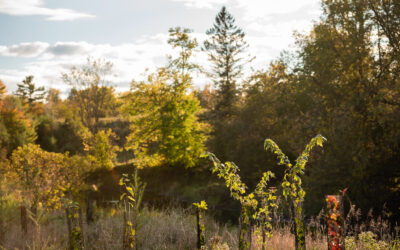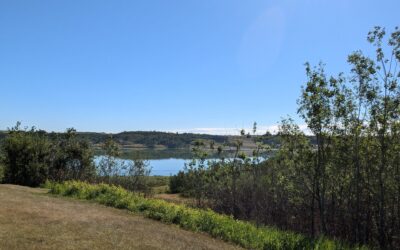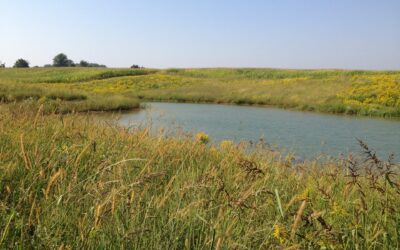Young ALUS participants inspire enthusiasm for agriculture
ALUS participants Bryan and Kyle Maynard are young PEI farmers whose farm succession story—told through their evocative photography, entertaining videos, and active social media pages—is renewing enthusiasm for agriculture throughout the Island.
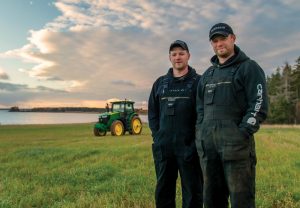
Meet the Farmboys! ALUS participants Bryan and Kyle Maynard are young PEI farmers whose farm succession story is renewing enthusiasm for agriculture throughout the Island. (Photo: Bryan Maynard)
The Maynards joined the ALUS program because, as Bryan explains, “ALUS encourages us to do more for the environment, and this is a tremendous asset for us—as farmers, and as Islanders.”
The Farmboys, as they are now known, grew up on their family farm in Arlington, in western PEI. Bryan returned to farming shortly after finishing school, while Kyle embarked on a career with a local aerospace company. After ten years, the opportunity came up to purchase part of Arlington Farms from their grandfather, Allison Dennis, and the brothers reunited to form Farmboys Inc.
The company name is a way of honoring their late father, who passed away in 1993 and would have been proud of his two boys for keeping the farm in the family—Bryan and Kyle’s own kids are now the fifth generation on this land.
Formed in 2015, Farmboys Inc. quickly started making waves in the western PEI agricultural scene. Through candid interviews and videos, photography, social media and two engaging websites (www.farmboyspei.com and www.farmyardphotos.com), they have been portraying their personal journey as they strive to grow potatoes for seed and processing and a variety of pulse and cereal crops, while continually improving the farm’s environmental footprint.
For the Maynards, stewarding their land has included enrolling 80 acres in the ALUS PEI program. These are parcels of marginal or ecologically sensitive land that they have retired from agricultural production and, instead, turned to the production of ecosystem services. The primary goal of all their ALUS projects is to shield the streams and rivers on their farm from the fine red topsoil on their fields, to help the water stay cleaner for those who live downstream.
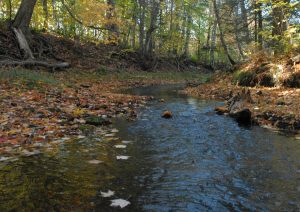
By helping to prevent the farm’s fine red topsoil from eroding into streams and rivers, ALUS projects help keep the water clean downstream, as shown here in the Trout River, a small stream that flows into the community of Tyne Valley. This is an important ecosystem service that ALUS helps farmers deliver for the benefit of PEI society at large. (Photo: Shawn Hill)
For example, the Maynards have established “permanent grassed waterways,” a type of ALUS project that is effective at reducing soil erosion to protect nearby streams. This involves maintaining a strip of grass down a cultivated field to direct drainage in low-lying areas. They have also marked out a “no-till” zone of formerly cultivated land around the perimeter of fields, especially those that are near streams or susceptible to erosion, greatly expanding the provincially regulated 15-meter buffer zone already established in those areas.
Bryan and Kyle are as excited by the opportunity to carry on their family’s farming tradition as they are to be involved in the ALUS program, which underscores the need for public support for agriculture and the environment.
“There is no other province in Canada as environmentally regulated as Prince Edward Island, but we cannot regulate everything in the working landscape,” says Bryan. “The ALUS program allows farmers to take more responsibility, and voluntarily retire marginal or sensitive areas, which means we can focus more attention on growing crops on prime farmland.”
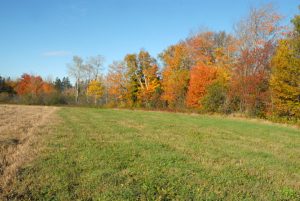
For the Maynards, stewarding their land has included enrolling 80 acres in the ALUS PEI program and implementing many ALUS projects to help reduce soil erosion. For example, this photo shows a new “no-till” zone ALUS has established around the perimeter of a hayfield, to greatly expand the buffer zone between the farming operation and a nearly stream. The stream is located inside the forested area, representing the provincially regulated 15-meter buffer zone around streams. (Photo: Shawn Hill)

